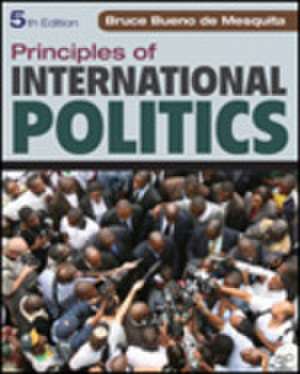Principles of International Politics: Principles of International Politics
Autor Bruce Bueno De Mesquitaen Limba Engleză Electronic book text – 14 mar 2013
The first part of the book, "Foundations" offers highly accessible coverage of key concepts, introducing students to different ways to think about the national interest and showing them how to use game theory and the strategic perspective/selectorate theory to better understand what happens in all aspects of international affairs. This section uses debate over North Korea's nuclear weapons development as an ongoing example to build concepts and build confidence in the student's how of basic modeling ideas. Also covered is a basic, intuitive introduction to game theory and other evidence and logic based tools for analyzing international relations.
Part II, "War," next provides a more thorough evaluation of how domestic political incentives and the domestic institutions of governance shape choices about conflict initiation, escalation, and termination. It also surveys major theories of war and conflict, working through hypotheses derived from constructivism, neo-realism, liberalism and selectorate theory and evaluating them against the evidence to see what actually works and what doesn't.
Chapters in Part III, "Peace," build on the logic of collective action to help students see why it is so difficult to get national governments to do "what is right" even when they can agree on what is right, with chapters covering the effectiveness of international organizations and international law, as well as a thorough evaluation of environmental issues, human rights enforcement and the domestic and the international political economy of trade.
Part IV, "World Order" emphasizes efforts to promote the spread of democracy and economic prosperity. It also addresses how to understand and deal with terrorism. Whether examining terrorism, the spread of democracy or the alleviation of poverty, chapters in this section carefully examine which strategies work, which do not, and why. The Arab Spring provides a useful ongoing example of the strengths and weaknesses of foreign aid policy and military intervention policies.
No other introductory text delivers such an easily-understood contemporary explanation of international politics, while truly enabling students to learn how to mobilize the key concepts and models themselves-thus develop a new method for thinking about world affairs. More than ever before, Principles provides a comprehensive evaluation of all aspects of international affairs, systematically compares the accuracy of competing approaches to international relations, and walks students through the simple, intuitive models and games that capture the essence of the strategic, selectorate viewpoint.
Preț: 522.55 lei
Preț vechi: 567.99 lei
-8% Nou
Puncte Express: 784
Preț estimativ în valută:
88.23€ • 91.16$ • 73.40£
88.23€ • 91.16$ • 73.40£
Indisponibil temporar
Doresc să fiu notificat când acest titlu va fi disponibil:
Se trimite...
Preluare comenzi: 021 569.72.76
Specificații
ISBN-13: 9781483300436
ISBN-10: 1483300439
Pagini: 600
Dimensiuni: 187 x 232 mm
Ediția:Fifth Edition
Editura: SAGE Publications
Colecția CQ Press
Seria Principles of International Politics
Locul publicării:Washington DC, United States
ISBN-10: 1483300439
Pagini: 600
Dimensiuni: 187 x 232 mm
Ediția:Fifth Edition
Editura: SAGE Publications
Colecția CQ Press
Seria Principles of International Politics
Locul publicării:Washington DC, United States
Cuprins
Introduction
I. FOUNDATIONS
1. Evaluating Arguments about International Politics
2. The Strategic Perspective: When Foreign Policy Collides With Domestic Politics
3. Tools for Analyzing International Affairs
4. An Introduction to Game Theory
II. WAR
5. Why War: The Big Picture
6. Domestic Theories of War
III. PEACE
7. How International Organizations Work, Or Don’t Work
8. Global Warming: Designing a Solution
9. Human Rights, International Law and Norms
10. Free Trade or Fair: The Domestic Politics of Tariffs
11. Globalization: International Winners and Losers
IV. WORLD ORDER
12. Foreign aid, Poverty and Revolution
13. Can Terrorism be Rational?
14. A Democratic World Order: Peace without Democratization
Appendix A. Modern Political Economic History and International Politics
Glossary
Bibliography
I. FOUNDATIONS
1. Evaluating Arguments about International Politics
2. The Strategic Perspective: When Foreign Policy Collides With Domestic Politics
3. Tools for Analyzing International Affairs
4. An Introduction to Game Theory
II. WAR
5. Why War: The Big Picture
6. Domestic Theories of War
III. PEACE
7. How International Organizations Work, Or Don’t Work
8. Global Warming: Designing a Solution
9. Human Rights, International Law and Norms
10. Free Trade or Fair: The Domestic Politics of Tariffs
11. Globalization: International Winners and Losers
IV. WORLD ORDER
12. Foreign aid, Poverty and Revolution
13. Can Terrorism be Rational?
14. A Democratic World Order: Peace without Democratization
Appendix A. Modern Political Economic History and International Politics
Glossary
Bibliography
Descriere
No
other
introductory
text
delivers
such
an
easily-understood
contemporary
explanation
of
international
politics,
while
truly
enabling
students
to
learn
how
to
use
the
key
concepts
and
models
themselves

